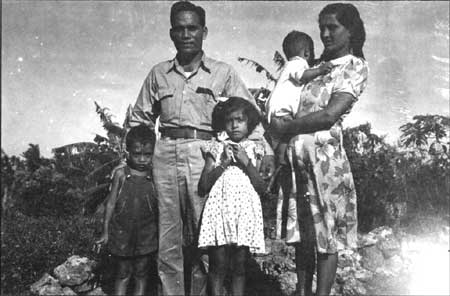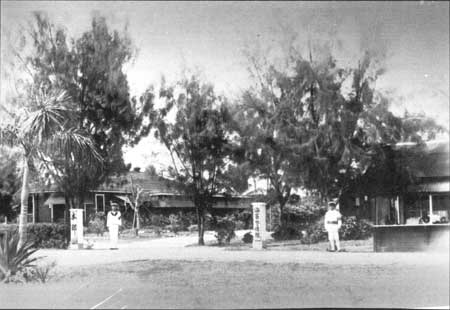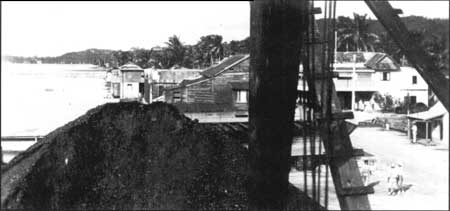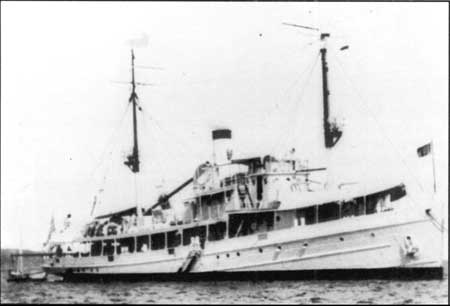| The War in the Pacific |
|
LIBERATION — Guam Remembers A Golden Salute for the 50th anniversary of the Liberation of Guam
Sablan never afraid to preach The late Joaquin Flores Sablan loved to teach. He lived a long life and career as a school teacher before and after World War II and was a professor at the University of Guam. But he possessed a greater love - to preach the Word of God. Sablan, who died just last fall, was the only Protestant minister in Guam during the Japanese occupation. But through the hardship of the occupation and war, Sablan's ministry as a Baptist preacher continued despite Japanese threats of reprisals against those who practiced "the American religion." Annie Sablan Aldeguer, now 79 years old and residing in Agana Heights, said her brother, the first Chamorro Protestant minister and just 29 years old in 1941, continued preaching though the Japanese military officials attempted to intimidate him. "Yes, the Japanese beat my brother, slapped him, telling him that they were going to erase America from Guam, and that he was teaching people Protestantism, 'the American religion'," Mrs. Aldeguer said. She said that the late Pastor Sablan, who was schooled and ordained in Indiana, traveled around Guam by bicycle, by walking, and by carabao cart to Inarajan, to Talofofo, to Agat, and also even Yigo to minister to Guam's Protestant families. "But they chased him away from the church; the church was right there in the heart of Agana," Mrs. Aldeguer said. The Japanese confiscated the Baptist church, using the building's first floor to store food and the second floor as a Shinto place of worship; the occupation authorities also kept the church organ for their own use. The Catholic cathedral in Agana was likewise converted for the Japanese as a center for propaganda and as a site for Japanese entertainment. "They told him that he should not preach, but my father told him not to be afraid to preach the Word of God, that if he couldn't preach in a church, he should preach in the jungle, preach the truth of God anywhere." And that Sablan did. Pastor Sablan's ministry to people seemed to be fairly normal despite the occupation and the Japanese presence, said the Rev. Angelo Sablan, the late pastor's younger brother and the current pastor of Agana Heights Baptist Church. "Everything was the usual," said Pastor Angelo. "There were services, Bible studies, baptisms - we did those in rivers - and funerals." Deacons and members of the Christian Endeavor Society also assisted in ministering to the people's spirits during the occupation. But the Japanese did not want things to be normal by any means. Sablan and the two Roman Catholic priests, the Rev. Jesus Duenas and the Rev. Oscar Calvo, were allowed to remain in Guam and tend to the spiritual needs of the people ... but only under conditions set by Japanese Governor Homura, the head of the occupying authorities.
The Chamorro clergymen were ordered to start every service by having all present bow to the emperor; they were only to speak in Chamorro, no English was allowed; they were to meet with the Japanese governor every month and brief him on their religious activities, "and to cooperate by telling the people that the Japanese were winning the war," Pastor Sablan wrote in his memoirs, "My Mental Odyssey". "No sermon was permitted to be preached unless it was approved by the governor a week prior to its delivery." At his very first service after the Japanese invasion, Sablan was monitored by a Japanese officer. "I had been speaking in English, but immediately shifted to the native language, aware that the unexpected guest would not know what I said. I asked my people to stand, face northward to Japan and bow to the Emperor. Once again scared, they gave me dreadful expressions. The service turned into a Bible study and meditation without singing because we could not make use of the hymnals written in English. After giving a short talk, I dismissed the congregation with a benediction," he wrote. Despite the fact that he lived in a valley and in a time of darkness, Sablan was led to the mountain top. In December 1942, he and the members of the General Baptist Church met - as a preacher and his congregation. Together, they spent a very special Christmas, at Mount Santa Rosa in Yigo. There, at the mountain top, they gathered "...in order to be as far away as possible from the enemy. Church members also appreciated the fact that the place offered a panoramic view of the island and people could be sighted approaching from a far distance," wrote the late Pastor Sablan in his memoirs. He wrote that the all day service included "pep talks" by brothers John San Nicolas Taitano and Jose San Nicolas Taitano who encouraged the people not to lose faith that Americans would liberate the island. "The DeLeon sisters came in an oxcart from Barrigada, a distance of 10 miles, to sing special songs. The women, as usual, served sumptuous meals throughout the day and we ate sugar cane in place of candy because the Japanese had taken over all the stores where we might have obtained candy." That Christmas was a blessing but still the Japanese did their best to discourage him, coming to their family farm in Mama. In his book, he noted that he and his wife, Beatrice, finally tired of the harassment. "Besides taking our bananas, chickens and eggs and killing one of my cattle, they forced me to climb the tallest coconut trees in the Fonte Valley, and beat me several times for being pro American. We finally abandoned our farm to go back to Yigo and be with my in-laws." He wrote of one mandatory meeting with the Japanese naval Governor Homura where the official berated him in particular. "He told me that the Japanese had come to do away with all American influences, and that meant me and my religious people, being the Baptist denomination, of American origin." Homura then ordered him to conduct a census of Baptists "by name, age, village, and submit it to him as early as possible." Sablan conducted the census; only one family refused to be listed as Baptists "...yet the rest of my people bravely maintained their willingness even to die for their faith, if need be." Though Sablan feared the worst, it was late in the war and the census data was never submitted, never requested. Sablan and his wife, however, never forgot the threat that the Japanese official had made about erasing American influences. When their son was born in 1944, they named him Franklin Delano Sablan in honor of President Roosevelt. The late Pastor Sablan also described of a meeting between the three Chamorro clergymen and Homura. The governor told the Catholic priests in particular to discourage people from celebrating patron saint days and weddings with elaborate fiestas. He told them that war might be prolonged and the people might experience hunger and even starvation. Sablan wrote that Duenas objected, saying that the people believed that the saints gave them necessary assistance in time of danger and that he would not suggest to his people, in spite of hardship, that they should do less to demonstrate their love and devotion to these saints. "The governor became so furious that I thought he might use his Samurai sword on Duenas' neck, because of the priest's uncompromising attitude toward the conquerors, Pastor Sablan noted in his writings. Duenas, who was to be executed by the Japanese just prior to the Liberation, was a man of courage, Pastor Sablan wrote. "Witnessing Father Duenas in his courageous and firm stand for his faith, he represented religion at its best and spoke for his people without any concern for his own safety." Likewise in character was Sablan, a preacher of peace in a time of war, a man who received his strength and calling from a power higher than those who occupied his homeland. "Oh my goodness," said Mrs. Aldeguer when asked what gave her brother Joaquin so much strength in those occupation years. "You know, my brother ... he was preaching of Christ until he died." "When you have faith, faith in God, you can move mountains," she said.
|



